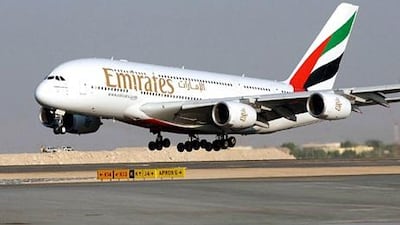Emirates, the world's biggest long-haul airline, vowed to "up our game" in the year ahead after reporting a 69 per cent drop in full-year profit as rising fuel costs and a stronger US dollar hurt earnings.
The Dubai airline's net income for the 12 months ending March 31 shrank to Dh871 million from a year ago amid flat passenger growth and tougher competition, Emirates said in a statement on Thursday. Annual revenues increased 6 per cent to Dh97.9 billion year-on-year.
The fiscal year "has been tough, and our performance was not as strong as we would have liked," Sheikh Ahmed bin Saeed, Emirates' chairman, said. "Higher oil prices and the strengthened US dollar eroded our earnings, even as competition intensified in our key markets."
The lowest annual profit in a decade comes as Emirates nears the completion of a re-evaluation of its route network and fleet over the past nine months to cope with a declining pace of growth compared to previous years and the decision to drop its flagship Airbus A380 superjumbo from long-term plans. Emirates' profit is the lowest since it reported Dh686m attributable to shareholders in March 2009.
Emirates is also grappling with oil prices that have recovered from 2014 lows to about $70 a barrel, a double-edged sword as higher crude prices mean inflated fuel costs that weigh on earnings while lower prices clip demand for air travel in its regional market. Last week, Emirates president Tim Clark said oil prices of $50 to $60 a barrel would be ideal.
"The uptick in global airfreight demand from the previous year appears to have gone into reverse gear, and we also saw travel demand weaken, particularly in our region, impacting both dnata and Emirates," Sheikh Ahmed said.
The airline's fuel bill increased 25 per cent, the biggest ever hike in fuel costs for the airline, accounting for 32 per cent of its operating costs compared to 28 per cent in the previous year, Emirates said.
Total operating costs increased 8 per cent in the fiscal year with fuel representing the biggest cost for the carrier.
The airline carried 58.6 million passengers, little changed with a marginal 0.2 per cent rise year-on-year, amid strong competition and as the airline increased seat capacity by 4 per cent. It received 13 new aircraft during the fiscal year, including seven A380s and six Boeing 777-300ERs, and phased out 11 older jets, bringing the fleet size to 270 aircraft by March-end.
Its load factor – a measure of number of seats filled – declined slightly to 76.8 per cent compared to 77.5 per cent a year ago due to the impact of "slowing regional economies on travel demand and strong competition in many markets", Emirates said.
However, yields rose more than 3 per cent helped by an increase in fares. The impact was offset by the strengthening US dollar against other currencies, a sensitive point for Emirates as the UAE dirham is pegged against the dollar.
Emirates Group, which includes airport and travel services arm dnata, reported a 44 percent decline in profits to Dh2.3bn while revenues increased 7 per cent to Dh109.3bn.
The airline's cargo increased 1.4 per cent to 2.7 million tonnes while aviation services unit dnata recorded Dh1.4bn, which includes Dh321 million gain from a one-time stake divestment.
The group's total workforce increased by 2 per cent to 105,286. However, the number of employees at the airline fell 3 per cent.
Emirates paid Dh500 million in dividends to its shareholder the Investment Corporation of Dubai compared with Dh2bn the year before.
Sheikh Ahmed said Emirates will "continue to work smart and hard" to tackle challenges and seize opportunities.
"It’s hard to predict the year ahead, but both Emirates and dnata are well positioned to navigate speed bumps, as well as to compete and succeed in the global marketplace," he said. "We must continually up our game, that’s why we invest in our people, technology, and infrastructure to help us maintain our competitive edge."


